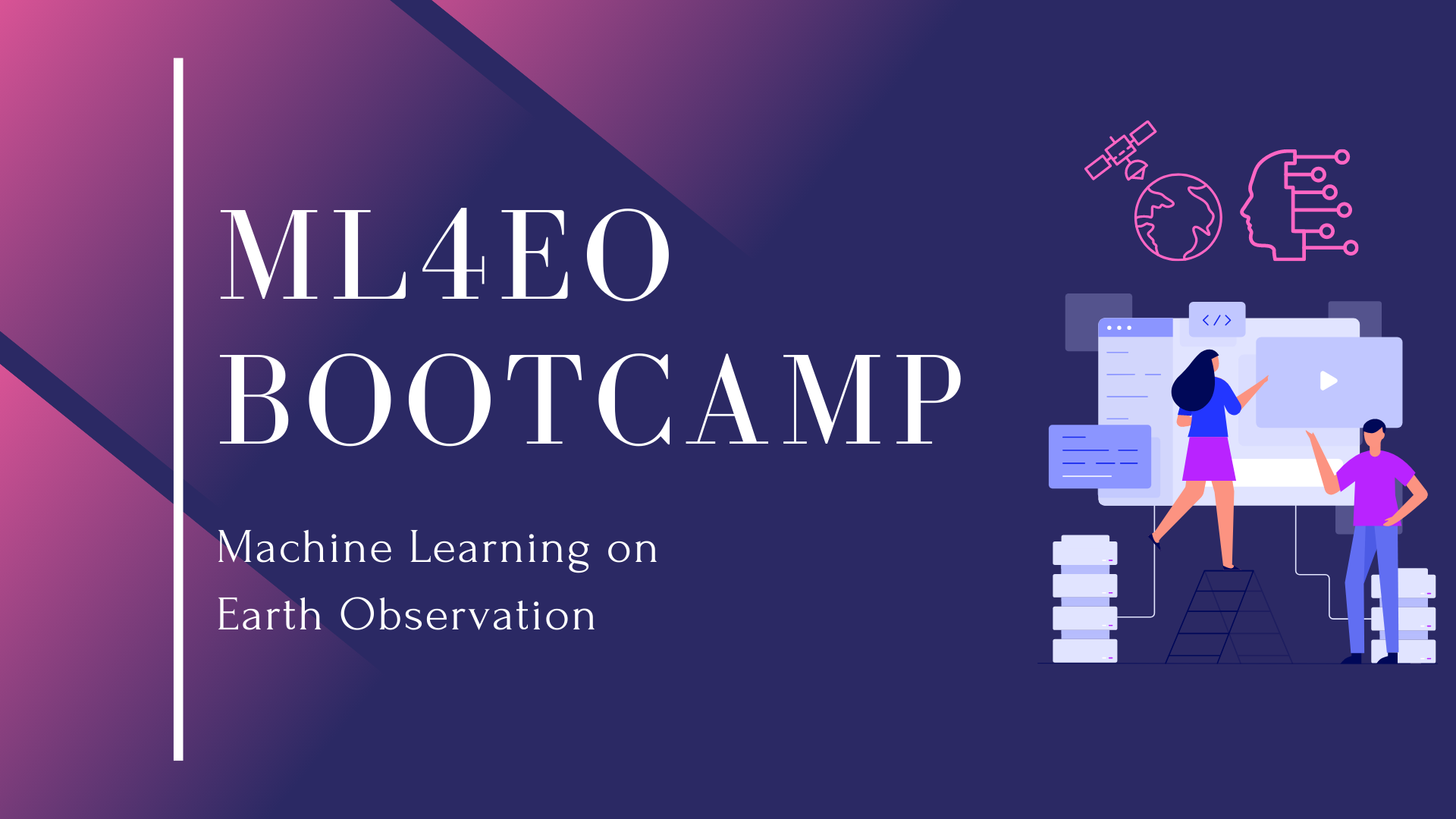
Earth observation (EO) plays a significant role across the Global Development Community to achieve the UN Sustainable Development Goals by providing imagery that can model the Earth and its changing environment. EO data have dramatically increased over the last decade, thanks to new space agency missions, improved technology available at lower costs, and growing commercial opportunities for remotely sensed derived analytics. Machine Learning (ML) techniques learn from data, identify patterns, and can make decisions with minimal human intervention. Many disciplines are taking advantage of ML techniques applied to EO to build applications that can help detect disease in crops, estimate crop yield, and optimize transportation routes, to name a few only. These technologies present a game-changing opportunity to identify and address unique, complex, and emerging challenges at local, regional, and global scales more accurately and more quickly. From poverty alleviation, climate change adaptation to sustainable resource management and humanitarian response, EO’s combination with ML can help humanity see, understand, and respond to a rapidly changing world.
This ML4EO Bootcamp aims to strengthen practitioners’ local capacity and skills, leading to diversifying ML applications. It is based on a “Training of Trainers Bootcamp in Africa,'' which ran from May 3-14, 2021 to develop a community of African regional experts that can collaborate on solutions to the continent’s needs and problems.
Who this course is for?
Entry-level data science or remote sensing practitioners. New graduates or Ph.D. students specializing in Earth observation and/or machine learning.
What will you learn?
● Establishing a baseline understanding of machine learning and Earth observation
● Learning how to access EO data for ML applications and generating insights from it
● Building machine learning models such as crop type and land cover classifications
● Learning how to be a successful trainer
How much time do you need to invest? It will take your around 40 hours to complete this course.
Related course: Artificial Intelligence for All: Open AI Training Data for Earth Observation
Prerequisite: The learner should have some basic knowledge of Python. To gain beginner knowledge of Python, explore open online courses using Radiant Earth's illuminate infographic
Course Certificate: You receive a certificate after completing all 11 modules of this course.
Course Developer: This course is brought to you by Radiant Earth Foundation and Makerere University with support from the FAIR Forward - Artificial Intelligence for All program, which is implemented by Deutsche Gesellschaft für Internationale Zusammenarbeit (GIZ) GmbH on behalf of the German Ministry for Economic Cooperation and Development (BMZ).
Contact Person: Louisa Diggs (louisa@radiant.earth)
Content License: CC-BY
Course: Machine Learning on Earth Observation: ML4EO Bootcamp | atingi
We are delighted to welcome you to the Machine Learning on Earth Observation (ML4EO) Bootcamp! Whether beginning or continuing your ML4EO educational journey, we hope you enjoy your experience.
This self-paced course includes 11 modules. There will be a lecture video in each module, together with additional resources, activities, and exercises to help you master the material.
To get started, we suggest you familiarise yourself with the course site, including the Python Dependencies section. Next, we recommend setting up a schedule to learn the material over the next few weeks or months. We also set up a discussion exchange forum that you can use to post questions about course content and to get help from others taking the course.
Upon completing the course, we ask that you take a few minutes to provide us with your feedback. Your evaluation will help us improve future courses.
Last, we invite you to join our Radiant MLHub LinkedIn community page and Slack channel. It is a great way to keep track of all our activities, including new training datasets, tutorials, and events. We hope you enjoy the journey.
Welcome once again to this ML4EO course!
Module 1 - Introduction to Earth Observations
Module 2 - Creating Training Datasets: Projections, Tiling, GeoJSON
Module 3 - Introduction to Machine Learning, Part 1
Module 4 - Introduction to Machine Learning, Part 2
Module 5 - STAC Catalog & Radiant MLHub Python Client
Module 6 - A Hands-on Training for Machine Learning in Python
Module 7 - An Introduction to Machine Learning with Digital Earth Africa
Module 8 - Machine Learning Applications in Land Cover Mapping
Module 9 - Crop Detection from Satellite Imagery using Deep Learning
Module 10 - Tropical Cyclone Wind Estimation from Satellite Imagery
Module 11 - Effective Teaching Practices
Organizers set up a Github repository that contains all materials for the ML4EO Bootcamp, including all the codes to run the notebooks.
In order to run the exercise notebooks, you will need to have Python >=3.8 installed. You will also need to install some Python dependencies.
If you are running the notebooks using Binder, all dependencies should be included in the host environment.
If you are running the notebooks on your local computer, go to the project root and run:
pip install -r requirements_dev.txt
If you are running the notebooks in Google Colab, you will need to create a new cell in the notebook with the following content:
from pathlib import Path
requirements = Path.cwd().parent.parent / 'binder' / 'requirements.txt'
!pip install -r $requirements
There is also an environment.yml file that can be used to create a conda environment.
conda env create -n my-environment -f environment-dev.yml
Windows Users
Some users were experiencing issues when trying to use rasterio.warp functions in a Windows environment. This is likely due to this issue, which was fixed in version 1.2. If you are experiencing issues with rasterio.warp on Windows please verify that you are using rasterio>=1.2.0.